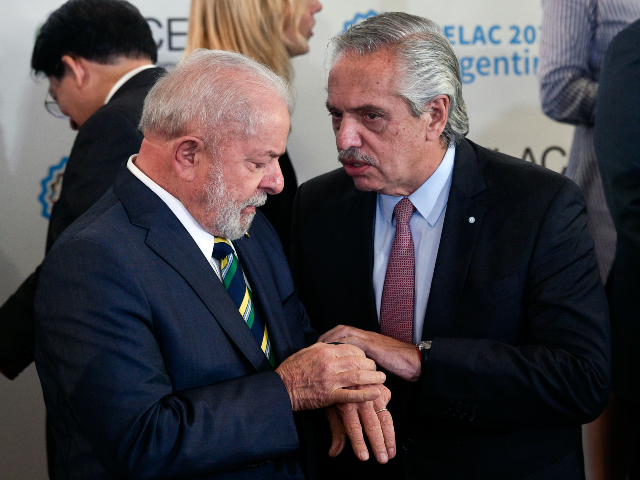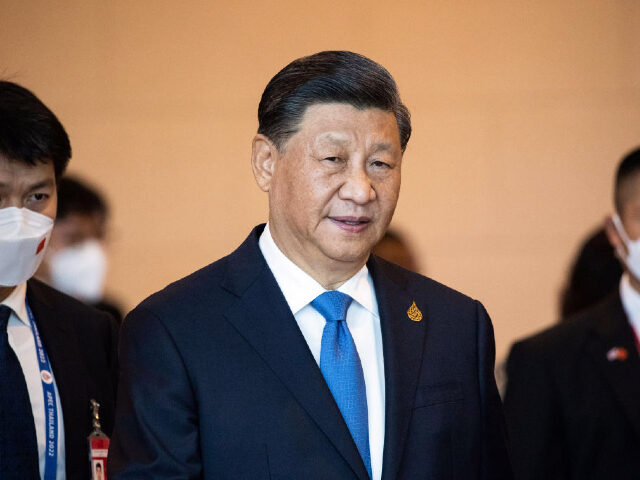Chinese dictator Xi Jinping addressed this week’s Community of Latin American and Caribbean States (CELAC) summit on Tuesday, urging the Western Hemisphere to embrace the Belt and Road Chinese debt trap program and emphasizing that China sees the region as a “key partner in enhancing solidarity.”
CELAC is a left-leaning platform that rivals the Organization of American States (OAS). It is currently holding a head-of-state conference in Buenos Aires, Argentina, hosted by socialist President Alberto Fernandez. Argentina is a Belt and Road Initiative (BRI) partner, alongside several other members of the coalition.
The CELAC conference has served this week primarily as a platform for the regional left to welcome back to power Luiz Inácio Lula da Silva, the corrupt former president of Brazil who was inaugurated into a third term as head of state on January 1. His predecessor, conservative former President Jair Bolsonaro, withdrew Brazil from the coalition in 2020. Lula – once convicted of taking bribes while president, but controversially freed from prison and allowed on the ballot – has spent much of the week using his platform to scold world leaders who condemn human rights atrocities committed by his allies in Venezuela and Cuba, telling reporters the communist dictatorships in both countries should receive “great affection.”
Venezuelan dictator Nicolás Maduro, a key ally of the Chinese Communist Party in the region, became the center of discord at the conference as Argentines protested the potential presence of a wanted drug trafficker in their capital city. After conservative lawmakers threatened to formalize his arrest and extradition to the United States, Maduro abruptly canceled his trip, blaming “neo-fascist right.”
Xi delivered a video address from Beijing to the summit amid this atmosphere of discord, focusing on selling China’s international projects intended to expand Communist Party influence and erode the sovereignty of foreign nations.
“President Xi Jinping stressed that China always supports the regional integration process of Latin America and the Caribbean,” the Chinese Foreign Ministry summarized Xi as telling the assembled regional leaders. “We highly value our relations with CELAC, and take CELAC as our key partner in enhancing solidarity among developing countries and furthering South-South cooperation.”
Xi asserted that cooperation with China would be “characterized by equality, mutual benefit, innovation, openness and benefits for the people.”
“More and more countries in the region have engaged in high-quality Belt and Road cooperation with China, supported and participated in the Global Development Initiative and the Global Security Initiative, and are working with China in building a China-LAC community with a shared future,” he noted.

Brazil’s President Luiz Inacio Lula da Silva, left, and Argentina’s President Alberto Fernandez talk after the group photo during the Community of Latin American and Caribbean States (CELAC) Summit in Buenos Aires, Argentina, Tuesday, Jan. 24, 2023. (AP Photo/Gustavo Garello)
The BRI is a global infrastructure plan in which China offers poor countries predatory loans intended to be used to pay Chinese companies to build pricey infrastructure projects, often ports or railways connecting remote areas. Many of the participating countries are located in the most impoverished regions of South Asia and Africa, but Beijing has attempted to lure countries in Latin America and Europe, as well, recruiting a wide variety of partners including Ukraine, Italy, Cuba, and Argentina. The Bolsonaro administration expressed interest in joining the BRI shortly before his election defeat, despite the president himself claiming to be anti-communist.
When BRI countries fail to be able to pay China using the Chinese loans for the infrastructure work, the Communist Party seizes the properties involved, eroding the sovereignty of that country. The most alarming example of this situation occurred in Sri Lanka, where China seized the strategically important Hambantota port for nearly 200 years after that country failed to pay its BRI loans.
The “Global Development Initiative” and “Global Security Initiative” that Xi mentioned in the CELAC speech are vague programs launched last year by Xi through a series of speeches that did not explain the objective or operational plan for either. The “Global Security Initiative” is particularly concerning as it appears to involve international military cooperation that places collective security above the national interests of the countries involved, but Beijing has not clarified exactly how it plans to organize such cooperation. The People’s Daily, the official newspaper of the Communist Party of China, explained in June that the Global Security Initiative “responds to the historical trends of economic globalization, world multipolarity, and democracy in international relations, stressing that security should feature universal benefits, equal access and inclusiveness based on mutual respect.”
Xi concluded his address to Western Hemisphere leaders by insisting that cooperation with China would promote “peace, development, equity, justice, democracy and freedom.”
China has attempted to insert itself in the CELAC’s affairs since at least 2015, when it held its first “China-CELAC forum” to promote Chinese influence in Latin America and non-Hispanic nations in the region.
“Since the turn of the century, China’s trade with Latin America has boomed, going from $10 billion in 2000 to $257 billion in 2013,” Chilean ambassador to Beijing at the time Jorge Heine observed. “This had a significant impact on Latin America’s growth. For Brazil, Chile and Peru, China is now their top trading partner (as is the case for 124 other countries around the world).”
Xi called the 2015 meeting a “new starting point” for China in the region, offering cooperation on trade and security.
Xi addressed this year’s CELAC at the invitation of the Argentine president. Fernández reportedly also invited left-wing President Joe Biden to participate in the summit, but Biden declined, sending representative Christopher Dodd to Argentina, instead.

COMMENTS
Please let us know if you're having issues with commenting.